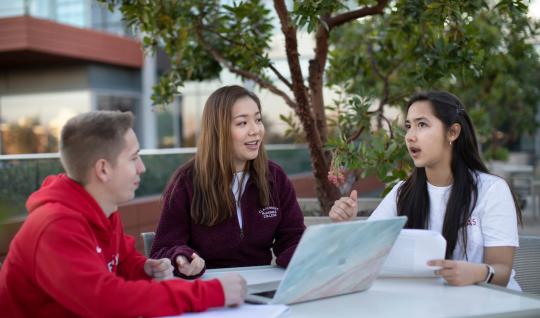May 27 – July 18, 2025
SRP provides opportunities for CMC students to conduct research on campus for 8 weeks over the summer (May 27 - July 18, 2025). Under the supervision of a CMC faculty member, students work on either a faculty member's research project or a research project of their own design. (Self-designed projects may be supervised by faculty in any CMC department, other than the Department of Natural Sciences (formerly Keck Science Department). Students interested in working with Department of Natural Sciences faculty should contact Velda Yount, [email protected]. Students will present their plans at an opening reception as well as present the results of their projects at a closing celebration.

Program Information
Key Dates
- February 14: Applications open for SRP.
- February 14 - March 6: Students must discuss their project with a faculty mentor and include an email from that mentor confirming this discussion as part of the application process. (See application forms linked below.)
- March 6: Online SRP applications due.
- March 27: Students and supervisors are notified via email of acceptance.
- March 27 - April 3: Students must accept or decline their SRP offer. Students who wish to accept are required to complete a registration form through the SIE portal and attend an SRP orientation.
- May 4: Deadline to submit SIE application for funding.
- May 27 - July 18: Summer Research Program (including weekly seminars).
Faculty Mentors
Prior to applying, prospective students should contact a CMC faculty member to discuss their interest in conducting a research project under their supervision (either a faculty member's research project or a research project of their own design). This discussion should cover:
- a description of the proposed project, including whether the student will be working on a faculty member's project or their own independent research project
- the nature of the work to be conducted by the student
- the expected outcomes (e.g., research paper/poster, annotated bibliography, data analyses, policy report, blog posts, etc.)
Expectations and outcomes should reflect the amount of work to be conducted in a full-time (40 hours/week), 8-week position. If the research will require some time off campus, e.g., for fieldwork or archival research, these expectations should also be made clear.
Financial Support
Students and faculty will be compensated for their participation in the program. CMC students who participate in the program are expected to work full-time (40 hours/week) for 8 weeks (except for CMC holidays), will receive an hourly wage, and will be expected to be on-campus unless their research requires fieldwork or archival research, in which case limited travel away from campus may be permitted.
Research Opportunities for Summer 2025
Faculty Projects for 2025 can be seen here. You may also reach out to CMC faculty who are not listed here to see if they have any summer research opportunities, or design a research project of your own and seek out a willing faculty supervisor. Students may also work together on a team project supervised by a CMC professor, either one the students design, or one the professor designs.
Previous Summer Research Projects
For examples of past projects, visit the links below:
- Summer 2025 Student Research Projects
- Summer 2024 Faculty Descriptions
- Summer 2023 Student Research Projects
- Summer 2022 Student Research Projects
Questions?
Please find additional information about this program on the FAQ page. If you still have questions, contact the Summer Research Program Director, Professor Rima Basu, via email at: [email protected].
Ready to Apply?
The application form is available here!
Acknowledgments
The Summer Research Program is grateful to the President's Office, the Dean of the Faculty's Office, the SIE Program, and the following research institutes and labs for their funding contributions to the program:
Berger Institute for Individual and Social Development
Dreier Roundtable
Gould Center for Humanistic Studies
Lowe Institute for Political Economy
Mgrublian Center for Human Rights
Rose Institute of State and Local Government
Salvatori Center for the Study of Individual Freedom in the Modern World
